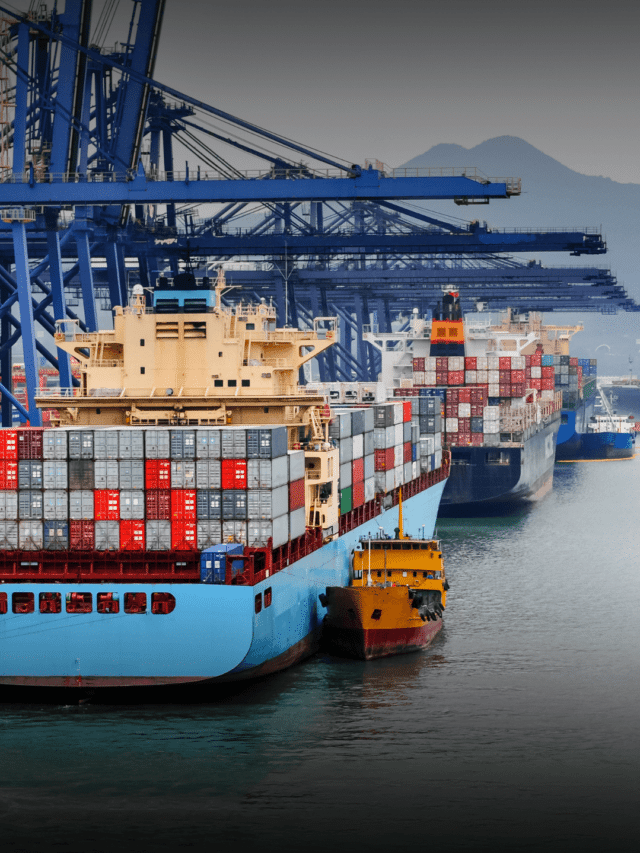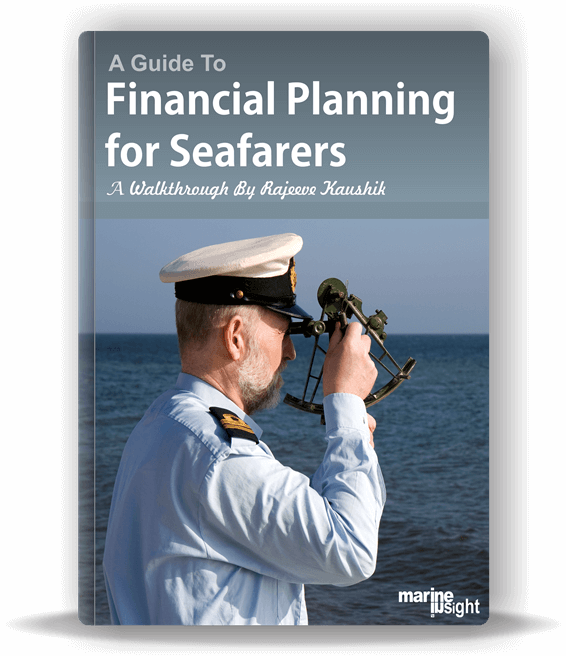Salary Earned At Sea: Is It Fair To Tax Income of Indian Seafarers?
Recently a verdict by Kolkata income tax tribunal against a Marine engineer has sent shivers down the spine of the entire Merchant navy community in India. In a hard hitting verdict the tribunal has directed this Marine Engineer to deposit lakhs of rupees as income tax earned by him as per demand raised by his assessing officer.
At first it was taken as a rumour but the truth sank in gradually when Maritime Union of India (MUI) and National Seafarers Union of India (NUSI) were found appealing to Indian seafarers to jointly raise their voices against the verdict through their unions. The Kolkata tribunal has ruled against two merchant navy officer very recently.

It is natural to ask, “Why now?”
Before we delve further into the minuteness of the income tax acts, let me explain in simple words what is “dual residence.”
Although you work on board and not ashore in any country, the registry of the ship determines the local laws one must follow in addition to the other contractual terms you sign with the ship owners / management as long as you are on board. That is the reason you carry seaman book (CDC) and your license of that particular country before joining ship in addition to your national license (India for instance). After completion of your contract you return back to your country of residence. When you are on board, technically you are a tax resident of the country whose flag your ship is flying. It is immaterial whether you are resident in that country or not. If the flag state taxes you on your income and in the absence of a double taxation avoidance agreement with your country of residence, you may be liable to pay taxes in your country of residence also. Therefore it is very essential to know your tax liabilities towards the flag state and your country of residence before you sign a contract with a shipping company. Consult a chartered accountant or tax consultant when you are in any doubt.
The residential status of a person is decided under two different Acts, one under Income Tax Act, 1961, ( I.T. Act) and another under Foreign Exchange Regulation Act, 1973 (FERA). The concept of Non-Resident under FERA is different as compared to that under Income Tax Act. Under Income Tax Act, the residential status of a person is determined on the basis of number of days he stays in India whereas under FERA, it is the intention of a person to be in India or outside India would be an important factor determining his residential status.
For ship’s crew, an Indian citizen who leaves India in any previous year for the purpose of employment outside India or as a crew member of an Indian ship, would be treated as a resident in India if he stays in India in that year for 182 days or more. Conversely, if he stays in India for less than 182 days, he will be treated as non-resident for that year and his foreign income would not attract tax liability.
So all these years Indian seafarers were enjoying a tax free income while working on board and meeting the NRI requirements as per the income tax act. Their return of income too were accepted by the tax authorities.
The Tribunal cited clause 5(2)a of the income tax which states that any income deposited by the employer of a Indian in a NRE account held by the respective Indian is taxable income. This has opened the Pandora box and put the entire seafaring community at the risk of losing lakhs of rupees as Income tax which they safely considered all these years as “Non-taxable” or “Exempted income”.
What has happened cannot be undone. But before we jump to various conclusions on the basis of rumour, propaganda or misleading information, let us first understand the law and how we can protect ourselves in the future.
As per section 5(2)(a) of the income tax act:
(2) Subject to the provisions of this Act, the total income of any previous year of a person who is a non-resident includes all income from whatever source derived which—
(a) is received or is deemed to be received in India in such year by or on behalf of such person ; or
(b) accrues or arises or is deemed to accrue or arise to him in India during such year.
The clause (a) which reads as income is received or deemed to be received in India has to be understood in the context of whether the payments are made in India whereby the recipient is receiving the payments in India from the payer.
So if you ask your foreign employer to deposit your salary first in an NRE account than the entire amount shall be added to your taxable income and section 5(2)(a) will apply to your income. In one single stroke a smart income tax officer has checkmated the brilliance of our Chartered accountant and tax lawyers.
So will tribunals all over the country take cue from this judgment and tax seafarers hard earned money for all the previous years? So where do we stand today? What can we do?
It is natural to be angry, anxious and frustrated and frankly a lot of seafarers may not be having any money to pay all the previous year’s taxes demanded by IT officers.
What Options Indian Seafarers Have?
The solution to this problem lies in taking one of these measures:
A.Take help of your employers and open a bank account in a foreign country.
Request your employers to deposit your salary in this account. You may leave standing instructions with this bank to remit this money to your nominated Indian bank account in India thereafter. The PROS and CONS of this step are:
PROS
If account is maintained in a country where there is no income tax or no tax on foreign remittances then you save taxes on your income earned as a NRI.
CONS
You pay remittances charges for transferring money from a foreign account to an Indian NRE account.
You may be required to pay tax on all money paid by your employer in absence of DTAA.
B.Draw your entire salary in cash and bring home in cash or Demand draft after sign off.
Declare it to the customs on arrival. This however has more CONS than PROS.
There is always a big risk in carrying thousands of foreign currency in person.
Ship managers or owners are always hesitant to supply large amount of cash to Master in a port due to risks of Piracy, heavy currency exchanges etc.
If value of total currency exceeds $10000 in a US port, then be prepared to declare it to US customs and face a volley of questions for several hours just to explain the source of such large amounts.
Other countries too have currency restrictions when carried in person.
C. Support the unions to fight this case in supreme court of India on your behalf.
The strong shining light in your favour shall be the ignorance of the entire Chartered accountant community and the Income tax officials. They should be questioned why they were ignorant for so many years and caused seafarers to assume that their salary in foreign water was non-taxable.
Not too long ago, the Central board of direct taxes notified through a gazette that Indian seafarers working on Indian flag vessels are exempted to pay taxes on the earnings on a foreign going vessel. All these seafarers have a bank account in India and the salary too comes from the Indian employer. So definitely the tribunals have not taken this into account before passing their judgement on a NRI seafarer.
You don’t deserve it!
It’s time the Indian community wakes up to the sacrifices of Indian seafarers and the Government should fully understand the contribution of Indian seafarer to the world maritime and to their country as well and amend the laws accordingly.
Over to you..
Do you think it is fair to tax salaries of seafarers who make dozens of sacrifices and face great hardships at sea?
Disclaimer: The authors’ views expressed in this article do not necessarily reflect the views of Marine Insight. Data and charts, if used, in the article have been sourced from available information and have not been authenticated by any statutory authority. The author and Marine Insight do not claim it to be accurate nor accept any responsibility for the same. The views constitute only the opinions and do not constitute any guidelines or recommendation on any course of action to be followed by the reader.
The article or images cannot be reproduced, copied, shared or used in any form without the permission of the author and Marine Insight.
Do you have info to share with us ? Suggest a correction
Related Posts
Subscribe To Our Newsletters
By subscribing, you agree to our Privacy Policy and may receive occasional deal communications; you can unsubscribe anytime.
Web Stories

About Author
Capt.Pankaj Bhargava is a Master Mariner who retired from active sea life in the year 2012. He has sailed on almost all types of vessels in a career spanning more than 35 years. Presently teaching in Maritime institutes and loves writing for e-magazines for the benefit of seafaring community.























I am thinking a still better solution is to relocate to a country where seafarers are respected and their work is recognized. Leave India for good. I think its not an easy task to convince a corrupt bureaucracy and judiciary system. Leaving the country is an easier option i feel.
As per the standard behaviour of Indian sea farers, this gentleman has gone to great deapths of useless information just to find some useless justifications for a judgement which can be easily challenged in a court of law. If double taxation is the basis of giving tax exemption to seafarers can anybody explain why the seafarers in UK are enjoying this benefit of tax exemption on the basis of the rules very much similar to our 183 days rule? I don’t think the seafarers in UK are paying tax in any other country.
It is shame that our unions are not taking strong steps and Union govt should call this judgement a null and void. They have no idea of the hardship onboard ships and all these lawyers are robbing our system.
When China, phillipino, Malaysian and other seafarers are exempted, why Indian IT department want to play with Indians. As such Chinese have overtaken India with max officer in maritime industry. After this no one will join merchant Navy.
This will lead to less dollar coming back to India. Ultimately India will suffer…time to leave India..
merchent nevy should not have pay tax as export and import of country depend on merchent nevy .they remean away from family for long time for country.
I am filing NRI for first time, which ITR file should i fill? Where should i write about the salary??
how to apply and what the PROCEDURE TO APPLY pLX FULL gUIDE MEE
What about working in indian offshore company. Do we need to pay income taxes
All seafarers must file the income tax (irrespective of the type of ship and duration they are sailing – FG or offshore).
For Indian offshore company, you have to pay the taxes as you are not out of Indian waters for more than 182 days.
Those who are looting India are tax free and we guys are planned to be taxed, this is not right. Best solution is to double the tax of every politician, compared to other indians, else where they are enjoying their life with our money.
This issue is resolved in favour of seafarers. Central Govt (CBDT) has issued Circular 13/2017 dt. 11/04/2017. It is not taxable if salary is credited to NRE account in India by foreign ship. Circulars are binding on tax authorities.
For that, seafarer needs to ensure proper sea time/ out of country time for tax exemption